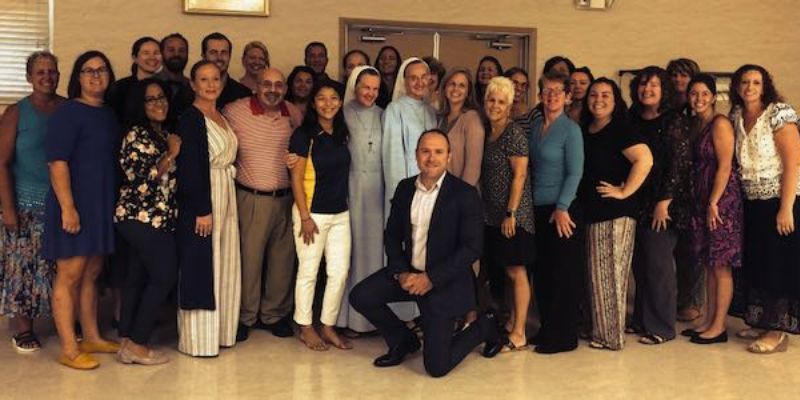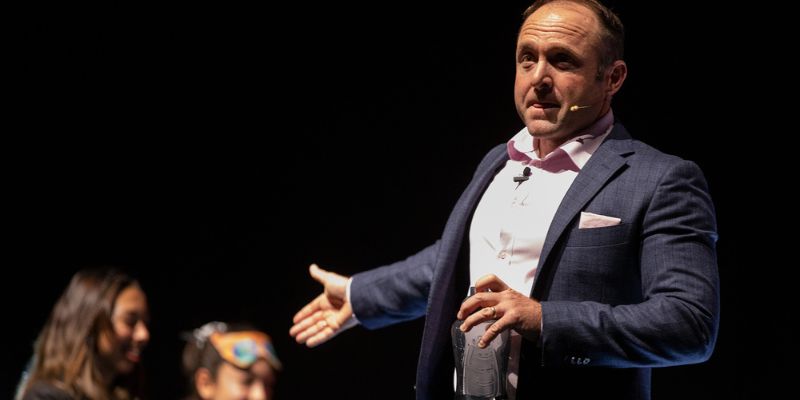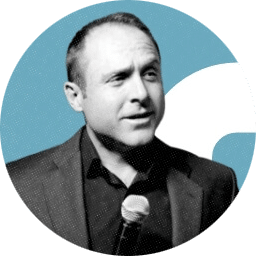In today’s episode, we explore leadership in Catholic education, starting with the principle that leadership is influence. Join us as we discuss how self-leadership shapes the leadership culture in schools and beyond. Over the next three days, we’ll explore into the conditions and types of influence leaders wield. Don’t miss out—tune in tomorrow for more insights.
Welcome Aboard
Hello there. My friend, Jonathan Doyle, is with you once again. Welcome aboard to the Catholic Teacher Daily Podcast. I’m pleased you’re here today. You and I are going to talk a little bit about leadership in the Catholic educational context.
Leadership's Role in Education: A Catalyst for Transformation

It is one of those things that, if you’ve ever read Homer’s Odyssey and the Iliad, you’ll remember: Helen of Troy was the face that launched a thousand ships. I like to think that leadership in the educational context is the word that launched a thousand consultancies because it’s one of those things that was so central to the Catholic educational project. We hear about it a lot, but what does it really mean? And what does it have to do with everybody who’s listening today.
Some of you listening are thinking, I don’t actually have a distinct leadership role, Jonathan. So should I just stop the podcast today? Please my friend do not hit that pause button. I’m really passionate about speaking to everybody today about leadership.
Now, what I’m going to share with you today will be useful. Not just in your vocational work. But right across your whole life. Two weeks ago, I had the pleasure of doing a speaking tour in the beautiful state of Tasmania. For my American listeners, again, if it sounds exotic, it is. It’s an incredibly beautiful part of the world. I had the pleasure of speaking to large groups of emerging leaders—people who have identified the desire to go into leadership. So they’re not necessarily in a leadership position at the moment.
Self-Leadership: The Foundation of Effective Leadership

What did I talk about? I’m on a bit of a crusade right now, but I talk a lot about self-leadership. And I want to lead you over the next three days. I want you to listen for the next three days, because we’re going to talk about three key aspects of leadership. But before we do it, I want to talk about self-leadership. Because if, again, you’re leading, if you’re teaching, you may think I’m teaching; I’m not leading. I’m convinced about self-leadership, which is basically this idea that all of us are leading ourselves somewhere all the time. Essentially, we are in a leadership role at the very least in our own lives.
Visionary Leadership: Shaping a Preferred Future

I talk a bit about visionary leadership, and the idea of visionary leadership is a well-articulated preferred future state that is better than the current state. So all of us in our lives are making choices, making decisions, and valuing things based on some sense of the future being slightly better than the present.
If you think about it, I’m right. It’s a central aspect of how we live our lives. What we do is not purely rational, right? So sometimes we do go backwards, but in general, most of us would at least give lip service to the idea that we’re trying to move forward in life. We’re trying to improve, trying to get better. I’m really convinced that we are all leading ourselves somewhere.
Leadership Reflection: Influence and Change

I said to the emerging leaders: This big group of Catholic emerging leaders was, ‘How can the leadership in a Catholic school, the leadership culture in a Catholic school, be anything more than the self-leadership of individual leaders.’
As these individual leaders lead themselves and develop themselves, how they lead others can only be a reflection of how they’ve led themselves. Because if they’ve done a poor job at self-leadership, then that’s going to manifest in the leadership they give and bring to others. But I hope it wasn’t too convoluted there, but based on what I’m trying to say to you, that’s what proceeds the leadership that we see on the surface is the leadership that takes place in our own lives.
I just want to remind you that I posted this on Instagram last week, and my Instagram account is at @jdoylespeaks. So I posted that we’ve got to get back in the sort of cockpit, the driver’s seat of our own lives. Yes, we filter that through a Christian lens, through a Catholic lens. It’s a dynamic, vibrant partnership with the Lord. And the Lord, of course, is sovereign.
I think he does give us a great invitation to take some responsibility for our own lives, and a way to think about that would be to think about if you’ve ever raised children. You don’t dominate every single aspect of their life. You direct them, you have aspirations for them, and you try to grow them in virtue and character, but you also are hoping that they develop that mantle of self-directed self-leadership over time.
Defining Leadership: Influence and Influenceability

That’s the setup for what self-leadership is and why it matters because it’s conditioning all the other leadership that follows. I want to give you a three-step process. We’re going to do this over three days. I’m going to give you three very simple statements about leadership. I want you to think about how you can apply them either in a classroom, in your own life, or in Catholic leadership at a higher level.
One of the big things I do in my live seminars when we’re talking about leadership, we talk a lot about the problem of definition. A very contentious topic, you could bring a hundred of the world’s greatest leadership experts into a room, and you are not necessarily going to get consensus about what leadership even means.
I do a simple three-step process based on my master’s level study. I have a master’s degree in educational leadership and management, There was a quote that came from John Maxwell, the well-known leadership speaker, where he just said, leadership is influence.
"It does not matter if you are a Cardinal or a first year kindergarten teacher. We all play a crucial role as leaders in Christ's advancing kingdom."
Jonathan Doyle Tweet
Maxwell’s been at the forefront of leadership thinking for maybe 40 years. And he’s basically saying, How do you know leadership has happened? Influence has happened. What’s influence? And the way I define that is something that has changed. Now there’s all kinds of influence that can happen. I’m going to talk about that tomorrow.
The first thing I want you to be thinking about is that if you’re leading yourself, you have to be able to influence your choices and behaviors in a positive direction. You have to be in charge of that. If you’re leading in a classroom, let’s just say you’re teaching a kindergarten class, a first grade class, or whatever level. Your leadership in that room is coterminous; is this almost the same as your influence in that room. Are you influencing people to become better? Are you influencing students to grow in their relationship with Christ? That’s leadership because it’s influence.
Tomorrow's Focus: Conditions and Types of Influence
Now influence can go all sorts of different ways, so we’re going to get onto that tomorrow. Make sure you tune in tomorrow. We are going to talk about the conditions and the type of influence.
Today’s a bit of a setup podcast where we put these principles into play. But I want you to start thinking about this. Are you happy with the level of influence you are having over your own life? And are you happy with the level of influence that you’re having in the classroom? Are you happy with the level of influence you’re having in the whole school context? If you’re a principal, if you’re an archbishop listening to this or a cardinal, Are you happy with the level of influence and change that you’re seeing as a result of how you are bringing your gifts and charisms into the world?
So that’s the first thing I want you to think about in this episode. What is leadership? Leadership is influence. Are we all leaders? Yeah genuinely, I think we are. For many years I didn’t think that.
In my seminars, I even talk about how at high school, even in junior high school, we were all conditioned to believe that we are all leaders; remember that good-looking kids would get elected to SRC roles or leadership roles. The rest of us would be told, but you’re all still leaders too. And none of us believed it. I think that we are, and I’m very convinced that my job is to lead my own life in partnership with Christ under his direction. He does give me the power and authority to make decisions and choices and to lead myself, and leadership is what influences.
Conclusion and Call to Action

That is the little thing I want you to file away today. I would love for you to share this with people. Maybe if you liked this idea of leadership being influence, just post it on Twitter. Put a link to the podcast to give people a chance to go deeper into it. That is it my friend for today. I want you to think about the fact that leadership is influence, and I’m going to be talking to you tomorrow. We’re going to go deeper into the conditions and the influence, and you’re going to love it. It’s very interesting how this all comes together.
The website is jonathandoyle.co. You can book me to speak live, consultancy and coaching work for executives. But my heart and passion are seminars for staff and students on a whole range of related topics in terms of the evangelization mission, And all that good stuff is on the website. If you find yourself on Instagram, come and say hi. You can find me at @jdoylespeaks one word jdoylespeaks.
God bless you. My friend. Tune in tomorrow; you and I are going to talk about the conditions and the type of influence that leaders create. God bless this, Jonathan Doyle. This has been the Catholic Teacher Daily Podcast. You and I are going to talk again tomorrow.




